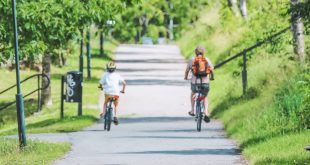“We are always looking for ways of growing our business, interally or by acquisation,” said Burke.
“We’ve done a great job at both over the past 15 years. For sure there’s a lot of consolidation going on right now [in the global marketplace]. Schwinn/GT and Derby were interesting situations.
“We looked at both. But 80 percent of all mergers fail and, for that reason, I’d have to have very good reasons to merge. I needed to have a high degree of confidence I could turn [Derby] around. I also needed to be sure any merger would not affect the Trek business.
“We would have bid on the whole thing not just some of the brands. But despite all our work, it became obvious we should steer clear. I think that’s the right decision for Trek.
“Trek has solid fundamentals and they haven’t changed over time. It’s family owned. My father founded it. It’s not just a business it’s part of our family.
“Public companies have investors who usually have a lot of expectations, often short term ones that cannot be met. There can be adverse long term consequences of these decisions.
“Another of our fundamentals is the people we have. Our management line up is made up of people who’ve been here a long time. Our marketing director has been with us for 15 years, our director for global sales for 18 years, our aftermarket director for 15 years.
“All are under 40. It’s a blend of experience and youth.
“Retailers are a main component of our success. Most other suppliers say they are the main component of their failure. We have phenonemel relationships with our retailers.
“B and C retailers are in trouble. B & C suppliers are in trouble. A dealers are doing great. Fortunately for us we tend to deal with A dealers.
“We’re doing well but nowhere near our potential. We have such a long way to go, we’rejust scratching the surface.
“2000 was a record year for the company. 20001 was a record year for the company. $375 in sales.
“Our business is better in the US than in Europe. We need to improve in Europe. It’s not a peope thing, the quality of our people is just as high in Europe as here. It’s figuring out how to translate the best practices of here in Europe.
“The fundamentals of the bike remain good. There are environmental concerns, health issues, and bikes are the easiest and simplest solution to transportation problems.”
How much of Trek’s recent success can be attributed to Lance Armstrong?
“We [owe a lot to Lance]. He’s an equipment nut and he benefits from the relationship too. If you go to the Tour, Lance is the best rider but the Postal team is on the best equipment too. That’s not just a proud sponsor talking. I’m always amazed at the lack of technology at the Tour.
“We’re not just a mountain bike company. We sell an enormous amount of road bikes. The mountain bike may be going like this [Burke points downhill] but we diversified.
“The next growth area has got to be comfort bikes. We have an ageing population.
“And in five to ten years transportation will be a spur to growth. Look at the traffic in London. Someday somebody’s gonna figure all that infrastructre in Holland makes a difference. You can’t keep building more and more roads.”
 BikeBiz Bicycle and cycling retail news
BikeBiz Bicycle and cycling retail news



